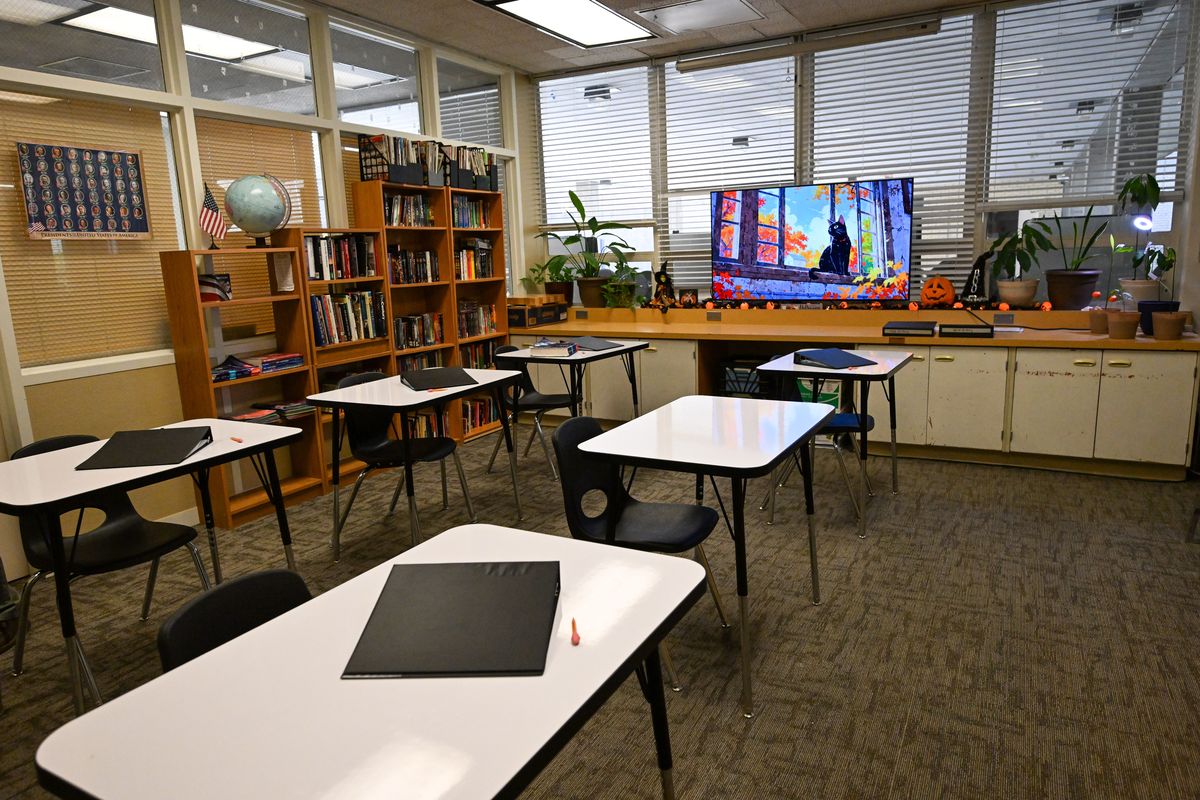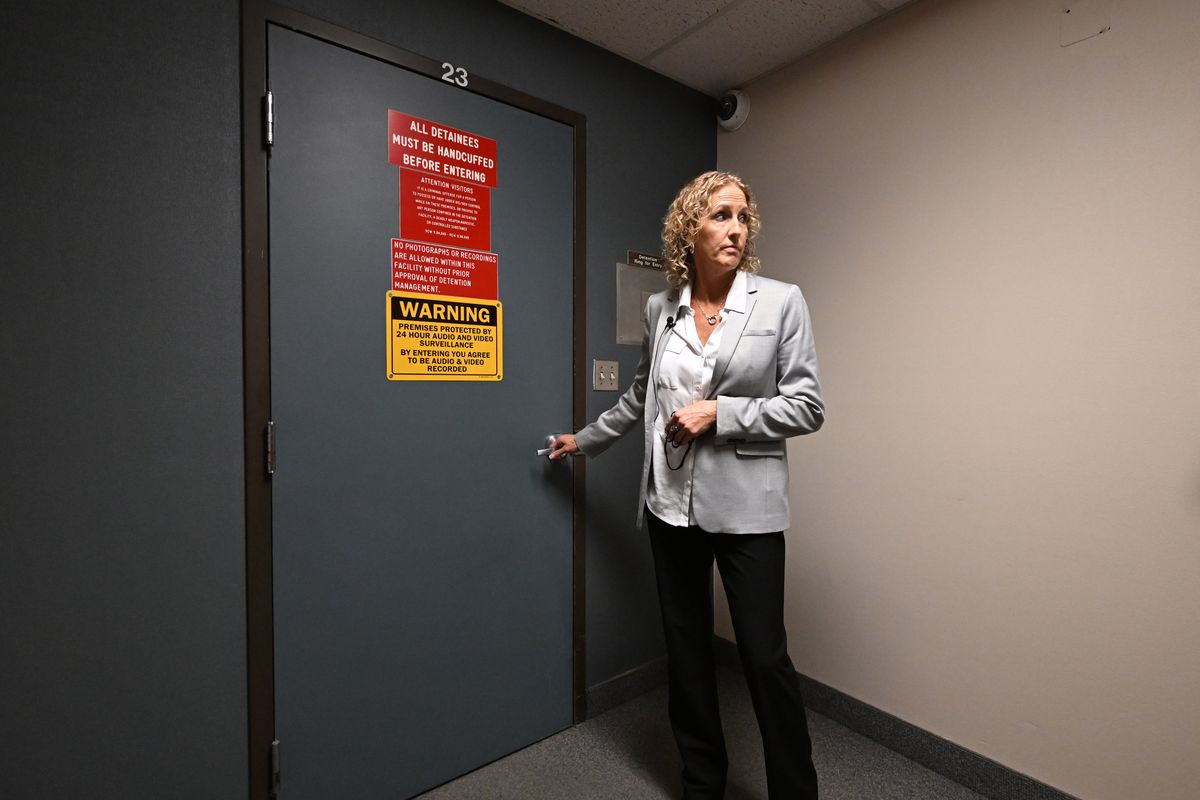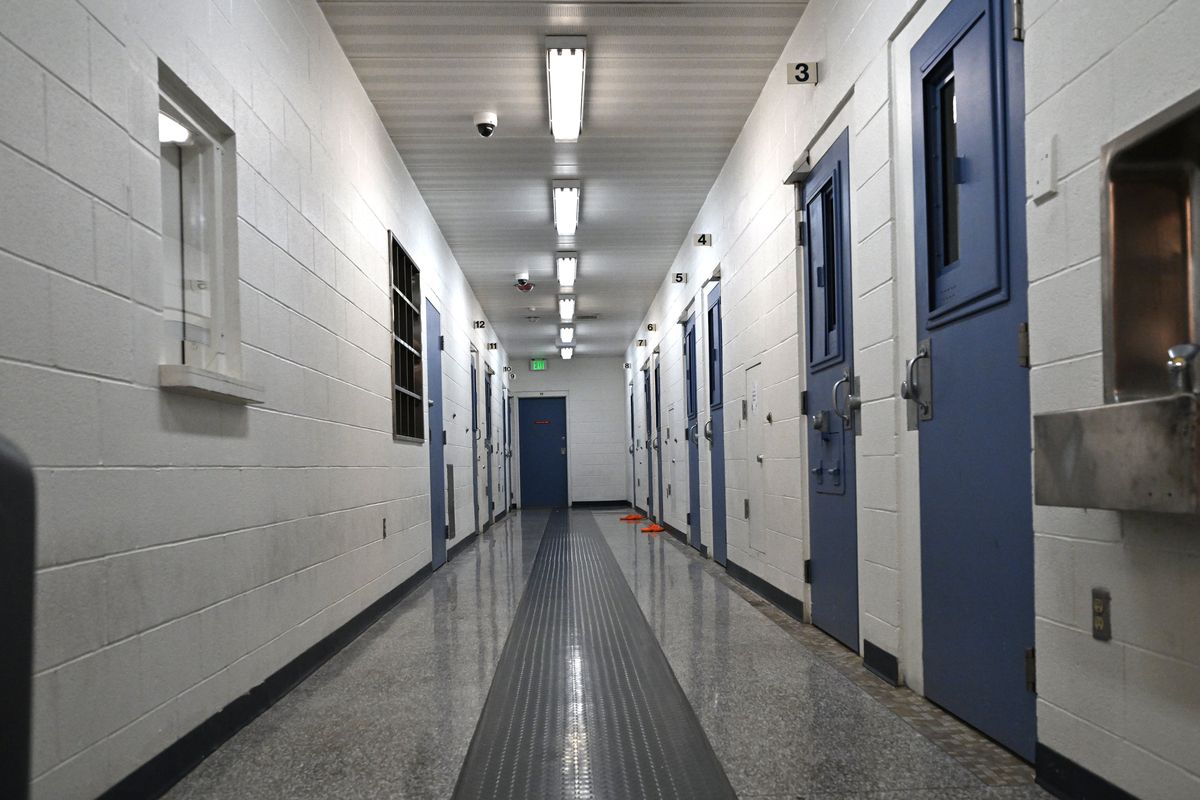Spokane County leaders say renewal of juvenile justice tax would be ‘money well spent’
Tori Peterson, the Juvenile Court Administrator, prepares to lead a tour of the Spokane County Juvenile Detention Center on Wednesday, Oct. 2, 2024. The county is asking voters to renew a 30-year-old levy this fall to continue funding juvenile detention program. (Jesse Tinsley/The Spokesman-Review)
Spokane County voters will decide this November the fate of a nearly 30-year-old sales tax that funds large portions of the region’s juvenile justice system.
The 0.1% sales tax, first passed in 1995, is the primary funding source for the county’s 39-bed juvenile detention center located on the county’s campus in the West Central neighborhood. November will be the fifth time voters have been asked to renew the tax, with the measure receiving overwhelming support in 1998, 2003, 2008 and 2015.
The tax generated $15.8 million in revenue last year, which helps cover the costs of employing 25 correction officers, four probation counselors and three medical staff members and administrators. The tax also helps keep the county’s 39-bed juvenile detention center operating 24/7.
Around 40% of the revenue generated through the sales tax covers the costs of the juvenile system, and the remaining balance goes into the roughly $60 million budget for the adult detention center’s operations and maintenance, said County Commission Chair Mary Kuney.
Spokane County Commissioner Amber Waldref said that while the juvenile justice program receives some state funding and allocations from the county’s general fund, most of that funding goes into some of the system’s detention alternatives, like probation and community services, support groups and other programs for at-risk youth.
The detention center, its staff, and the building’s operations and the home monitoring program are funded through the sales tax, Waldref said.
“The way I like to think of it is, this sales tax goes to anything inside the building and the building itself,” Waldref said.
She said if the tax were not renewed, the county would need to look for other funding sources within the county, which could lead to some of those alternative programs being cut. She worries what that might mean for at-risk youth, noting that the county is considered a leader statewide and throughout the state in implementing alternatives that yield positive results.
Tori Peterson, Spokane County Juvenile Courts administrator, said her department is committed to community safety, accountability for youth offenders and rehabilitation efforts to better their lives and keep those offenders from cycling through the justice system into adulthood.
The focus on rehabilitation is one of the most significant differences between the juvenile justice system and the adult justice system, Peterson said.
“Our goal is to keep them out of the adult system,” Peterson said. “With adolescent brain development, they’re not fully developed till age 25. So there’s still a lot of hope for us to impact some change in thinking.”
The Juvenile Courts offer educational programs for those seeking GED diplomas, job skill trainings, anger management and emotion regulation courses and a slate of other offerings intended to help youth offenders improve their lives, Peterson said.
Most of those programs are overseen by the staff of the detention center, whose salaries are covered by the tax proceeds. While the detention center’s walls provide immediate community safety, the staff’s efforts pay dividends in the long term, Peterson said.
“Changing that behavior and that mentorship and getting kids connected to positive, pro-social activities, that skill development is what brings long-term community safety,” Peterson said. “When we can send them back out better than when they came in, and with more skills to deal with all the stuff they have to deal with, that’s where you get that community safety.”
She said that work is important because many youth offenders may not have access to those development opportunities and typically have a slate of challenges outside their control.
In the more than 30 years she’s been with the department in a variety of roles, Peterson said she’s rarely seen a child enter the detention center without experiencing some level of trauma such as domestic violence, abuse, exposure to drugs or instability in the home.
“Wouldn’t it be great if we had a community where we didn’t need a juvenile detention center?” Peterson said. “But we do. So what we do is we focus on what we can do so that when they’re not here, they’re better in our community. We do both: we care about the kids and we care about community safety.”
Spokane County Sheriff John Nowels said he sees the tax proceeds and the work done through the Juvenile Courts as “money well spent.”
“I think it saves money in the future,” Nowels said. “If we can get kids rehabilitated and get them to change behavior in the long run, then we’re not going to deal with them as adults.”
Nowels said a healthy juvenile detention center helps his deputies keep the community safe, noting that youth offenses rose last year. The number of felony cases adjudicated last year grew 25% from 2022, while the number of adjudicated misdemeanor cases grew by 44%, according to the county.
“It keeps the community safe, and if we lose that, there’s just going to be less accountability in a system that already has very little anyway,” Nowels said. “It ultimately ends up with more violence in our streets.”
Former Spokane County Superior Court Judge Harold Clarke, who sat on the committee that penned the statement in support of the measure in the county voter’s guide alongside Waldref and Nowels, said he volunteered his time to support the measure because he’s seen the positive impacts the system has on the community.
“Anytime you can impact the youth, even just taking a small number out of the system, has a big impact down the line,” Clarke said.
Clarke believes the strong support of the measure in past elections shows the community is comfortable investing into the system because of the positive outcomes. He hopes this year’s renewal ask does not get lost in the cluttered ballots that will include other new tax proposals, local races and the presidential election.
“I’m confident our voters in this county will step back and say, ‘Okay, what makes sense?’ ” Clarke said. “It’s always difficult to ask for tax money. But without some measure of imposing and spending taxes, we lose the quality of life that we have here.”
Editor’s note: This article was updated to include information on how the tax revenue is allocated provided by Spokane County Commissioner Mary Kuney after publication.



